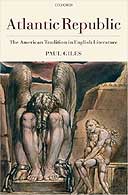
Atlantic Republic: The American Tradition in English Literature
by Paul Giles
OUP £65, pp432
As an off-message State Department functionary said recently, London's bridge has fallen down. George W Bush accepts the Burberry sweaters and slavish tongue shines proffered by Tony Blair, but ignores his advice. The notion of a special relationship, invented by Churchill in 1941 as he tried to entice America into the Second World War, has turned out to be a fond delusion. Reviewing the exchange of literary hostilities across the ocean between 1776 and the present, Paul Giles concludes that Britain and America, far from being kissing cousins, are inimical.
He begins by describing a rehearsal for the Cold War that took place in the 1840s, during a boundary dispute over Oregon; here it is bitterly ironic to find a Washington politician inveighing against 'the unscrupulous attempts of Great Britain at universal dominion'. Emerson, visiting Britain in the same decade, was dismayed by its closeted, complacent insularity and suggested that 'the courage of England' had migrated to 'the Allegheny ranges'. That, as Giles goes on to show, is more or less what happened. A succession of literary dissenters, suffocated by what poet Arthur Hugh Clough called 'stupid old England', sought freedom on the other side of the ocean. Clough's declaration that 'westward, the land is bright' counted as an almost treasonable rejection of his native culture. Churchill, belatedly deciding not to take offence, quoted the line in a wartime broadcast and turned it into a desperate plea for American aid.
Giles's argument is occasionally befuddled by academic lingo about deterritorialisation and transnational alterity, but he can express himself with commendable directness. Oscar Wilde, he points out, 'found America sexier than Britain'. Aesthete JA Symonds proselytised for Whitman and the jostling, promiscuous, erotic democracy of America and in 1913, Rupert Brooke cast an appreciative eye on a New York neon sign that, anticipating Mark Wahlberg in his Calvin Klein boxers, displayed 'a man-boy ... clad in celestial underwear'. David Hockney later explained his infatuation with California by saying he found the white socks worn by its young men irresistible (especially if that was all they had on).
The most interesting section of Atlantic Republic concerns migrations that were conscious acts of political sabotage, not just sly sexual escapades. DH Lawrence celebrated America as 'the great death continent' and called on its savage gods to expunge the 'white consciousness' of Europe. PG Wodehouse contentedly reconciled himself to Britain's defeat by the Nazis; he broadcast from Berlin during the war, and adopted American citizenship in 1955 to ensure that he could not be arrested for treason if he returned to Britain (he never did).
Auden, rather than flirting with fascism, presciently warned about the unenlightened hinterland that lay beyond his adopted home in New York. He quoted Louisiana dictator Huey Long who, 'when asked whether fascism could ever come to America, replied, "Sure. Only it will be called anti-fascism".' The remark stands out as a chillingly pertinent preview of Bush's warmongering since 9/11 and of his ingratiation with the bigoted God-botherers in the redneck states.
TS Eliot, a self-exile who crossed the Atlantic in the opposite direction, said that a country that has a civil war will always go on fighting that war. This is true of America, where north and south, black and white, remain at odds. The apocalyptic reveries of Angela Carter perpetuate and extend that self-rending violence; in The Passion of New Eve, California secedes from the union, after which Los Angeles and San Francisco aim missiles at each other. More startlingly, Giles applies Eliot's comment to Britain. After Cromwell's execution of Charles I, the monarchy returned in 1660; ever since, the prescriptive continuity of our culture has discouraged innovation in both politics and art. Restive republicans have no choice but to ship out, seeing the US as 'the land that their native country might have become' if the Cavaliers had not suppressed the Roundheads.
But the war at home is not yet over. In 1982, JG Ballard praised the nutter who fired blanks at the Queen during Trooping the Colour. In Martin Amis's Yellow Dog , the royal family has degenerated into squalor and sleaze. The king gawps at snooker on television while his adolescent daughter cavorts in a 'Princess Lolita' porn video; the establishment is held to ransom by an East End gangster who has relocated to California. As if in retaliation for such insults, Prince Charles, here moonlighting as a literary critic, dismissed Salman Rushdie as a 'bad writer' and groused about 'the cost to the crown' of protecting him against the ayatollah's assassins.
Giles's book is trenchant, unsettling and timely. A pity that the pricing policy of Oxford University Press ensures that it will largely be read in libraries.

